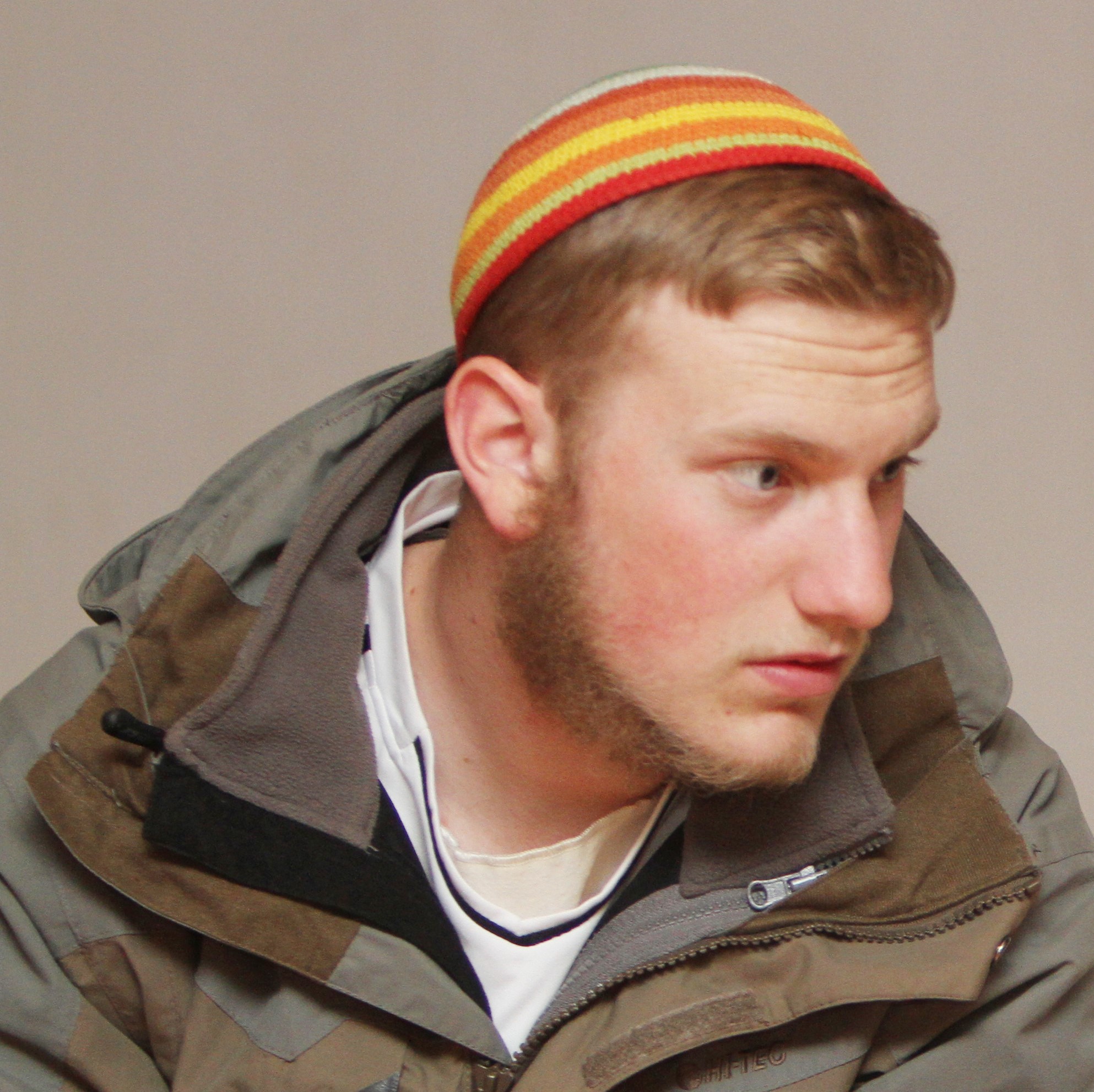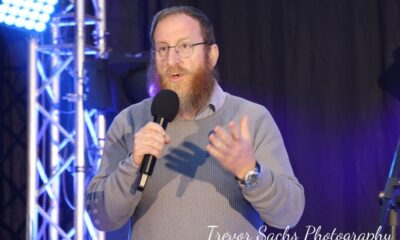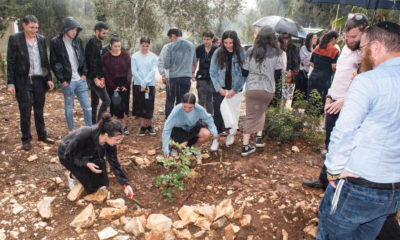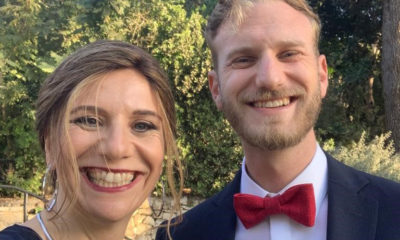
Israel

Kay family connection to Israel stronger than ever
Published
2 years agoon
It’s been almost two months since 26-year-old South African oleh Eli Kay was murdered in the streets of Jerusalem.
As the days pass and the reality of the tragedy sets in, one would imagine that his parents and siblings might feel angry or vengeful. But speaking to the SA Jewish Report from Israel, they say they want to move forward from a place of openness and positivity, contributing to the Jewish state and honouring Eli’s legacy.
“We are mourning deeply but in our pain, we are strong,” says Eli’s mother, Devorah Kay. “We are getting up every day, and plan our days in a proactive way. Sundays are particularly hard days [as Eli was murdered on a Sunday] and those need extra planning. It’s important for us to start being involved in things to make a difference in this country.”
The family hasn’t returned to South Africa since the tragedy. “We have never thought that ‘we need to leave’ because this happened to us,” says Eli’s father, Avi Kay. “On the contrary, this has strengthened our resolve that we made aliyah for a purpose. Being in Israel has been the most comforting thing. The support has been phenomenal, from our own community to the larger community, to support from South Africa.
“We understand that the terrorist attack was a ‘9/11 moment’ for the South African Jewish community,” he says. “And yet, though people were in shock and mourning, there was still an outpouring of letters, tributes, events, and projects in Eli’s memory. This shows just how special the South African Jewish community is.”
The family has no desire for revenge and doesn’t want to become embroiled in the complicated politics that follow a terrorist attack. At the same time, it doesn’t want any other family to endure this agony. And so, Avi and his daughter appeared at a hearing at Israel’s High Court of Justice on Tuesday, 11 January 2022. There, arguments were heard about whether the Israel Defense Forces can demolish the house of the killer, Hamas terrorist Fadi Abu Shkhaydam, a 42-year-old resident of Shuafat in East Jerusalem, who was killed in the minutes after the attack.
Kay provides background on these events. “A week or two after Eli was murdered, I was contacted by an organisation asking if our family would support it in pushing for the terrorist’s house to be destroyed [as punitive action for the murder].
“We said we absolutely wouldn’t proactively support it. If that’s procedure, then that’s what Israel must do, but it’s not our ‘headspace’,” says Avi. “Then a few weeks later, the organisation asked us to support it to push for the brother of the terrorist to be fired from his job as an Egged bus driver. We said, ‘No, it’s none of our business, and if he was an upstanding citizen, then why should he be fired?’ Perhaps we are naïve about Israeli politics, but it was something we were uncomfortable with and didn’t want to get involved in.”
Then, two weeks ago, “we got a call from the head of the army in the Jerusalem region, saying that it was a courtesy call to let us know that they will be destroying the house of the terrorist in 72 hours”. We asked if it had anything to do with us, and he said no, he was just calling to let us know. But then the terrorist family’s legal team petitioned the High Court to block the demolition, supported by the organisation HaMoked – Center for the Defense of the Individual.
The case then went to the High Court of Justice, and the Kay family was asked to be there by Palestinian Media Watch (PMW). PMW is a non-profit Israeli research institute that reports on the Palestinian Authority’s promotion and glorification of terror.
“We were apprehensive for a number of reasons”, says Avi. “First, for our own safety – we didn’t want our faces to be in the public eye. And second, we felt it was an ethical issue. But we were told that by appearing in court, we could prevent a future terror attack. If we weren’t there, it would look like we were indifferent, and if the house wasn’t destroyed, then there would be no incentive against another attack and no consequences”.
“So, we went to court not out of revenge but hopefully to prevent another terror attack. As our lawyer said in court, our family is uncomfortable with a home being destroyed, but if terrorists don’t kill Jews, then their homes won’t be destroyed.”
The outcome of the hearing is expected in two to three weeks. Avi points out that because the terrorist’s home was on the fourth floor of a five-story building, it won’t actually be demolished. Rather, they will seal that floor so that no one can get in and take out the internal walls. A senior engineer told the court that there would be no structural damage to the building, especially the units above or below. But that floor will essentially become uninhabitable.
Israeli media interviewed Avi and his daughter at the High Court, and both spoke spontaneously, with great feeling. Avi says his daughter has been “the heroine of this whole story”, navigating complex emotions and events with a wisdom beyond her 19 years. He says she and Eli were very close, and she plans to build her future in Israel. He’s also grateful to Midreshet HaRova where she has been studying for its support and guidance.
Speaking to the Israeli media at the hearing, his daughter said, “We’re here to ensure that this never happens again. As much as they’re trying to kill us, they’re also trying to create terror and manipulate us through fear. We’re here to say that we’re not going to be scared, we’re going to continue to fight against terror and make sure that this doesn’t happen again. We’re going to continue to walk in our streets, be strong, and show that this is our country and we’re not afraid of them. Eli’s life wasn’t given in vain. We’re here to continue his fight.’”
Avi emphasises that the family plans to stay in Israel, as “there’s a lot of work to do here, especially in areas that Eli was passionate about such as land, education, and agriculture. This is what we plan to spend the rest of our lives doing, being a vibrant part of Israeli society.”
He says other parents who have lost children to terror or wars “have reached out in the most incredible way. I never thought I would be part of a group that’s so large. It’s almost unfathomable that so many parents are suffering in the same way. There are many support organisations which have been a tremendous help in multifaceted ways.”
Asked about the virulent comments from anti-Israel South Africans regarding his son’s army service, Avi says he wasn’t aware of such a sentiment until now. “But it’s simple: Eli came to live here, and part of his inauguration and contribution was to do his military service to protect Israel.”
This doesn’t reflect opposition to their home country. “We and our children love South Africa, and it’s the most amazing place to live and bring up kids. My wife even left England to live there. We want to emphasise that we came to Israel, we didn’t leave South Africa. To the South African people and our community who grieve with us, all I can say is, ‘Thank you.’”











myra sutin
Jan 20, 2022 at 6:39 pm
What a remarkable family such compassion and understanding.
KOL HAKAVOD